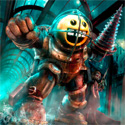|
Crossposting (with some tweaks) from the identify this book thread because it's more likely someone here might know it:quote:This is going to be extremely vague, but maybe someone will happen to have read it.
|
|
|
|

|
| # ? Apr 24, 2024 08:43 |
|
Kesper North posted:So here is some exceptional multimedia storytelling. I had to check and see if it was written by SwiftOnSecurity at first. This is still going on and I really really love it.
|
|
|
|
I have to give a plug for the Bobiverse series by Dennis Taylor. An IT nerd named Bob from our time signs up for cryogenics after he dies and gets hit by a car the next day and is killed. He wakes up a few centuries later with his mind uploaded to a Von Neumann probe and launched into the galaxy. There are other probes launched from other competing countries on earth, which destroys itself in a global war shortly after. The novels follow him and his progeny as they explore the galaxy and also compete/work with the other probes/personalities that were launched. It is a kindle unlimited series so free to read if you have the service. There are two books out so far and the third comes out next month I believe. It is a fun series with a lot of good humor. The character is definitely a self insert of your average IT nerd's fantasy about what he would do in such a situation, but despite that it is still a great series so far.
|
|
|
|
|
D-Pad posted:I have to give a plug for the Bobiverse series by Dennis Taylor. My nitpick with this one is how he brings up near light speed missiles and then says that the ftl radar would let the enemies dodge, but then later they find the enemy home planet. A planet is not going to dodge poo poo.
|
|
|
|
I read that a while back and didn't really enjoy it. Felt like it got a little overly self-indulgent with the "okay, we're gonna do this now" "great idea, myself." Kinda like somebody narrating a Master of Orion game but without actually making up different characters for the science advisor, the diplomat, the star admiral, etc. I also finally got around to reading Sins of Empire. Thought it was good, but I'd also say I was less enthused with it than I was with the first Powder Mage book.
|
|
|
|
Boatswain posted:Nice! Keep them coming as I think it's an interesting theme. I don't mind short stories/novels with other concerns as long as they feature art in an interesting way. I don't recall that, but there's an Asimov short story about light sculpture and attempts to build a creative robot.
|
|
|
|
Is there a Dune thread somewhere? Considering what a  universe that is I feel like some turbo nerd would have a good thread about it. universe that is I feel like some turbo nerd would have a good thread about it.
|
|
|
|
I don't think many read enough of it to be interested in "the universe". Most people I know gave up at 4 or 5 and I don't really blame them. Hell, I wish I'd quit after 4.
|
|
|
|
|
ianmacdo posted:My nitpick with this one is how he brings up near light speed missiles and then says that the ftl radar would let the enemies dodge, but then later they find the enemy home planet. A planet is not going to dodge poo poo. yeah i mean that's pretty clearly how he's going to beat those guys
|
|
|
|
anilEhilated posted:I don't think many read enough of it to be interested in "the universe". Most people I know gave up at 4 or 5 and I don't really blame them. They've been churning out prequels lately and I actually like them more than the original series because the prequels are dumb enough for me to understand. The original books are way too smart for me. Also Baron Harkonen as a recurring villain is just priceless.
|
|
|
|
Catberry posted:They've been churning out prequels lately and I actually like them more than the original series because the prequels are dumb enough for me to understand. The original books are way too smart for me.
|
|
|
|
Boatswain posted:Nice! Keep them coming as I think it's an interesting theme. I don't mind short stories/novels with other concerns as long as they feature art in an interesting way.
|
|
|
|
Catberry posted:Is there a Dune thread somewhere? Considering what a Just post a thread, more people should just post threads.
|
|
|
|
Just recommending the Warden series by Ken Lange. Read the first one on a recommendation from a friend who talked to the author, and it's surprisingly good. It's on KU if you have an account. It's UF set in Nawlins with a pretty decent Sci fi world as well. Good bit of worldbuilding, interesting characters. Decent read if you are looking for something new. Haven't read the second one yet but planning on it later this week.
|
|
|
|
A human heart posted:The books where frank herbert did a lot of drugs and had faux arabs run around and do martial arts moves on top of giant worms are too smart for you? Yeah I didn't get any of it and it made me feel like a peasant who deserves to stick to young adult books. Safety Biscuits posted:Just post a thread, more people should just post threads. Can't. I'm already busy mismanaging one OP in the gaming forum and I'm not even 20% done writing it even though I started the thread a week ago.
|
|
|
|
Half the philosophy Herbert writes is bullshit designed to spoof your smart thought detector. A good game is 'does this chapter epigram actually mean anything?' Destination Void is just the worst about this. 2/3 of the book is wordy rambling about the nature of consciousness without any grounding in neuro.
|
|
|
|
General Battuta posted:Half the philosophy Herbert writes is bullshit designed to spoof your smart thought detector. A good game is 'does this chapter epigram actually mean anything?' While on the other side you have Blindsight where the whole book you go "Yeah, right! What a crock!" and then get fed pages of notes and references to neuro studies at the end. Edit: Basically, after I read a book by Peter Watts this applies: 
BadOptics fucked around with this message at 00:04 on Jul 18, 2017 |
|
|
|
Watts is a dark motherfucker, this is definitely true. I think he looked at the available science options in school and saw "Depressing studies about species survival with dark implications for our own human natures" and headed straight for that door.
|
|
|
|
occamsnailfile posted:Watts is a dark motherfucker, this is definitely true. I think he looked at the available science options in school and saw "Depressing studies about species survival with dark implications for our own human natures" and headed straight for that door. Actually he studied marine biology, went to apply the field, and was driven
|
|
|
|
Did he ever post an update about his wierd, unexplainable illness?
|
|
|
|
General Battuta posted:Half the philosophy Herbert writes is bullshit designed to spoof your smart thought detector. A good game is 'does this chapter epigram actually mean anything?' My current favorite made-up philosophy is Quellism from Richard Morgan's Takeshi Kovacs books. I can't quite figure out exactly what it's based on, although there is def some Mao and Marx in there. Here's one of my favorite quotes that I have saved on my phone: Quellcrist Falconer posted:
|
|
|
|
R. Scott Bakker - Prince of Nothing Learned Herbert Read, in The Meaning of Art, posted:[...] [T]he function of art is not to transmit feeling so that others may experience the same feeling. That is only the function of the crudest forms of art—‘programme music,’ melodrama, sentimental fiction, and the like. The real function of art is to express feeling and transmit understanding. That is what the Greeks so perfectly realized and that is what, I think, Aristotle meant when he said that the purpose of drama was to purge our emotions. We already come to art charged with emotional complexes; we find in the genuine work of art, not an excitation of these emotions, but peace, repose, equanimity. I suppose not everyone has been introduced to R. Scott Bakker’s Prince of Nothing novels by having the “black demon seed” scene quoted at them. This is the delightful sequence in the second part of the trilogy, where Bakker describes the horror of a man, his wife, and his child being raped by a demon and the setting’s resident subhuman scum (Orcs, but less talkative). The phrase “raper’s thrust” is used. The defences offered was, first, that Bakker’s writing is good outside of the creepy sex stuff, and second, that the rape by demon/orc was actually a brilliant philosophical counterpoint to the moral-ethical pretensions that drive conflicts in the story. The latter defence is of course misses the point that Bakker’s writing is terrible. The first defence comes from the fannish mindset where problems in the text are to be tolerated instead of confronted. It is also the same defence as afforded to Japanese visual novels. It is a befitting introduction, because the overriding mode of Bakker’s narrative is perversion – of civilization, of humanity, of trust, of religion. There is nothing in The Darkness that Comes Before, first in an interminable saga, that is not overshadowed or at least overcast by dread. The thrill of this dread is what draws in the reader, and it is where Bakker’s meagre talent as a storyteller lies. Throughout the novel he displays a skill for catching the twinge of anxiety and dread within the reader, even with his amateurish prose. And being such an effective yet observably bad writer, Bakker’s novel is the very definition of hackwork. Much of the novel is concerned with a reimagining of the First Crusade, given a nihilistic bent and names that sound like somebody slurring through Tolkien’s elf-languages. Bakker likewise offers familiar genre clichés, just more vicious and with worse named. quote:“I am a warrior of ages, Anasûrimbor... ages. I have dipped my nimil in a thousand hearts. I have ridden both against and for the No-God in the great wars that authored this wilderness. I have scaled the ramparts of great Golgotterath, watched the hearts of High Kings break for fury.” In The Darkness that Comes Before, Anälsybarite Killhöuse receives telepathic summons bidding him to join his exiled father. Killhöuse comes from an isolated monastic community whose members are rendered superhuman by their postgraduate philosophy degrees, and upon reaching civilization finds himself a godlike manipulator among so many sheeple. In the meantime, great conflict brews between the great religions of the Mediterranean. The Pope preaches a Crusade against the Muslim conquerors of the Holy Land, while nobles and wizards intrigue, barbarians roam, and minions of the Dark Lord lurk in the shadows and fringes of the world. While this sounds eventful, this introductory part of a multivolume chronicle is occupied mostly with extended political and geographical manoeuvres: a disquieting amount of time is spent on the cast getting somewhere. Add in Conan the Bisexual Barbarian, the prose stylistics of Guy Gavriel Kay, the horror sensibilities of Clive Barker, just a little bit of rape and other atrocities, and you have something like RSB’s hodgepodge. Despite these diverse elements, Bakker’s writing is characteristically flat in the manner of countless genre authors. Usually he is content with an unremarkable half-realist mode that genre authors shotgun wed to the imaginative potential of fantasy and science-fiction. Central to this is the imposition of modern psychological realism on a world that is neither modern nor realist, and emphasis on extended dialogues of short exchanges that are intercut with brief, lifeless descriptions and snatches of internal monologue. This is ubiquitous to genre writing, and one can hardly differentiate authors in this mode save for the style of their silly names: quote:“I actually missed you, Xinemus,” Proyas said. “What do you make of that?” Bakker is also fond of a sardonically understated “chronicling” style familiar from Guy Gavriel Kay, where the prose bops and bounces in a self-contented manner: quote:Confusion and tragedy, rather than fanfare, had characterized the departure of the Vulgar Holy War from Momemn. Since only a minority of those gathered were affiliated with one of the Great Names, the host possessed no clear leader—no organization at all, in effect. As a result, several riots broke out when the Nansur soldiery began distributing soldiers, and anywhere from four to five hundred of the faithful were killed. These dull stylistics are all the more condemnable for the fact that Bakker is perfectly capable of reaching beyond this: a brief prelude, set two thousand years before the events of the novel, actually manages to capture some bleak grandeur, after which the book quickly begins to deflate. It would be even good if it were not for too many silly fantasy names. Bakker is apparently working under a quota when it comes to diacritics. quote:But the boy clutched his father’s sword, crying “So long as men live, there are crimes!” The Kay connection deserves elaboration: any knowledgeable reader who grabs the introductory part of the Prince of Nothing saga will notice that Bakker’s perhaps closest literary relation is bestselling fantasist and world-class hack Guy Gavriel Kay. This is not because they both write historically-inspired fantasy, but because they write in a strikingly similar manner. Kay has a certain set of “Kayisms” that he recycles in all of his novels. One has already been mentioned above), and another is philosophizing about certain classes or types of people. At times one suspects that principal characters such as the sad wizard Drusus Achaemenes and his prostitute lover Esmeralda (‘whore’ is a word of marked prolificacy in the novel) were ghost-written by Kay. The first chapters of Kay’s The Last Light of the Sun and Bakker’s novel make for an illuminating comparison: Kay, in The Last Light of the Sun, posted:Firaz ibn Bakir, merchant of Fezana, deliberately embodying in his brightly coloured silks (not nearly warm enough in the cutting wind) the glorious Khalifate of Al-Rassan, could not help but see this delay as yet another trial imposed upon him for transgressions in a less than virtuous life. Bakker, in The Darkness that Comes Before, posted:All spies obsessed over their information. It was a game they played in the moments before sleep or even during nervous gaps in conversation. A spy would look at his informant, as Achamian looked at Geshrunni now, and ask himself, How much does he know? Here one can observe the genre preoccupation with “world-building,” and making it feel “natural”. Even Kay defaults to it, despite ostensibly writing about real cultures under different names! Yet another Kayism not foreign to Bakker is the need to underline the meaning and significance of events and portents, which always conveys a sense of desperation on the author’s part: Kay, in The Last Light of the Sun posted:In all of us, fear and memory interweave in complex, changing ways. Sometimes it is the thing unseen that will linger and appall long afterwards. Sliding into dreams from the blurred borders of awareness, or emerging, perhaps, when we stand alone, on first waking, at the fence of a farmyard or the perimeter of an encampment in that misty hour when the idea of morning is not quite incarnate in the east. Or it can assail us like a blow in the bright shimmer of a crowded market at midday. We do not ever move entirely beyond what has brought us mortal terror. Bakker, in The Darkness that Comes Before, posted:Some events mark us so deeply that they find more force of presence in their aftermath than in their occurrence. They are moments that rankle at becoming past, and so remain contemporaries of our beating hearts. Some events are not remembered–they are relived. Both Bakker and Kay are admittedly absorbing writers in spite of their faults, or perhaps because of them. They have their differences, and the deciding one is that Kay acts out the role of pop historian with many of his novels – fascinated by the peculiarity and vitality of the past and its inhabitants – while Bakker writes like a sadist and nihilist. Kay’s adoration of common people and lionization of Great Men is offensive for its patronizing nature, but there are worse things. Kay writes badly but not unpleasantly. Bakker writes badly and unpleasantly. The bleakness of his story does not make it more truthful or insightful. His exploration of the fanatical vainglory of the First Crusade is rather perfunctory, despite occupying so much time. R. Scott Bakker posted:“But prayers,” Proyas continued, “are never enough, are they? Something will happen, some treachery or small atrocity, and my heart will cry, ‘Fie on this! drat them all!’ And do you know what, Achamian? It’s a possibility that saves me, that drives me to continue. What if? I ask myself. What if this Holy War was in fact divine, a good in and of itself? [...] Is that so hard to believe`?—that despite men and their rutting ambition, this one thing, this Holy War, could be good for its own sake? If it is impossible, Achamian, then my life has as little meaning as yours...” Some might defend Bakker on the basis of his academic credentials, but Bakker does not write The Darkness that Comes Before like a philosopher. Philosophy is to Prince of Nothing much like science is to speculative fiction: not a tool for understanding, but an aesthetic. Aristotle, among others, is repurposed and renamed for “world-building” purposes. Bakker does not have any philosophical treatise or thesis to propose, and covers for a lack of profundity in his novel with sheer volume. In the 600-page long first part of what will at least be a septology, Bakker introduces an army of figures, factions, metaphysical concepts, and faux-Tolkien names, yet has very little of interest to say. Clevin. Mostly he offers observations of stereotypes (“Whores sell themselves,” the wizard says, nodding sagely, “and you must be the whore when the time comes”), and rebrands medieval history while genre bullshit works at the margins (“A memorable challenge!” the villain of the prologue croaks, channelling the spirits of a thousand stock baddies). Bakker has one trick as a writer: overwhelming readers with a sense of doom and gloom. The dread of his world has superficial appeal that does not stand up to a critical eye. It is a psychologically and aesthetically sterile domain, and one seen begins to long for the levity of a postcolonial novel. His “philosophical” fiction does not teach. Umberto Eco immediately comes to mind as a legitimate alternative in the field of fiction – the abbey of The Name of the Rose is small compared to the Three Seas, but is at the centre of a vast mental universe. It is also written as to imitate pre-modern literature, despite its many compromises with the demands of modern novels, in contrast to Bakker’s banal and patronizing prose. Bakker’s novel cannot reach the expansive, speculative reaches of philosophy – even Kay breezes past him. The Darkness that Comes Before sinks for its baggage. And since we simply can’t end things without some infernal onyx juice: R. Scott Bakker posted:When she climaxed for the final time, she felt as though she’d been pitched from a precipice, and she heard her own husky shrikes as though from afar, shrill against the thunder and his dragon roar. That comparison to visual novels is more felicitous than it seems: R. Scott Bakker’s Darkness that Comes Before is on the level of a Type-Moon production. BravestOfTheLamps fucked around with this message at 00:08 on Jul 24, 2017 |
|
|
|
But does it have a patch to remove the sex scenes?
|
|
|
|
BravestOfTheLamps posted:That comparison to visual novels is more felicitous than it seems: R. Scott Bakker’s Darkness that Comes Before is on the level of a Type-Moon production. Non-snarkily, I would love to see you write about Kara no Kyoukai.
|
|
|
|
Well, I suppose he was considerate enough not to force that upon the Bakker thread.
|
|
|
|
Jew it to it! posted:Well, I suppose he was considerate enough not to force that upon the Bakker thread. Is this an allusion to that scene from the Bakker book?
|
|
|
|
Four times you use a variant of "Bakker's writing is effective but he's still a bad writer", how can something be bad and good at the same time?
|
|
|
|
Strom Cuzewon posted:Four times you use a variant of "Bakker's writing is effective but he's still a bad writer", how can something be bad and good at the same time? So I take it you didn't read the opening quote. e: But to be less snippy, he's good at inspiring a sense of dread, dreadful at anything else, and he drives this one trick of his into the ground for the whole book. And there's a projected eight books worth of follow-up, apparently all of it more of the same but with increasing amounts of sci-fi. BravestOfTheLamps fucked around with this message at 23:42 on Jul 18, 2017 |
|
|
|
That bravest post was actually pretty good imho This quote in particular I thought was spot on quote:Central to this is the imposition of modern psychological realism on a world that is neither modern nor realist, and emphasis on extended dialogues of short exchanges that intercut with brief, lifeless descriptions. This is ubiquitous to genre writing, and one can hardly differentiate authors in this mode save for the style of their silly names: Mel Mudkiper fucked around with this message at 23:37 on Jul 18, 2017 |
|
|
|
Mel Mudkiper posted:This quote in particular I thought was spot on I totally owe that to this guy, though.
|
|
|
|
Who was it that said BotL's criticisms were boring? Because that's some first-grade snark.
|
|
|
|
|
BravestOfTheLamps posted:I totally owe that to this guy, though. Ah, but yeah, it is something I have been noticing through my tour. I frequently see sentences that exist not to be meaningful but only to be informative, and as long as they provide information effectively the author seems to find them sufficiently written. They seem content to tell without finding beauty in the telling.
|
|
|
|
BravestOfTheLamps posted:So I take it you didn't read the opening quote. I was being glib, think you're allowed to be glib back. As much as I love his dread and religious terror (I'm a fan of his epigraphs and idioms for this reason, the setting is so wholly and ubiquitously nihilistic) his prose is clunky as gently caress and I don't think you'll find anyone defending it, here or anywhere. Particularly his overuse of extended "nooooooo"s which always put me in mind of teenage fanfiction.
|
|
|
|
I know that I read The Darkness That Comes Before about five years ago, but I can't recall anything that happened in it. Perhaps this is why.
|
|
|
|
.
BravestOfTheLamps fucked around with this message at 20:12 on Dec 16, 2017 |
|
|
|
Mel Mudkiper posted:That bravest post was actually pretty good imho haha I write like this when I'm making myself write and it drives me loving crazy e: It is a superficial mode of characterization which mimics the camera's lens: the dialogue is interrupted by small telling gestures that reveal a character's interior state. It's all over, I don't really know how to not write it, and I sort of hate it. Except when it's invisible and good? I don't even know. General Battuta fucked around with this message at 01:19 on Jul 19, 2017 |
|
|
|
I also have a big problem with writing like that when I don't have some really strong inspiration pulling me out of it, so I appreciate BotL calling it out.
|
|
|
|
johnsonrod posted:Did he ever post an update about his wierd, unexplainable illness? Not yet! The extrasolar virus that has infected him to direct him away from avenues that might reveal it is working as intended.
|
|
|
|
navyjack posted:My current favorite made-up philosophy is Quellism from Richard Morgan's Takeshi Kovacs books. I can't quite figure out exactly what it's based on, although there is def some Mao and Marx in there. Here's one of my favorite quotes that I have saved on my phone: drat, that's an awesome quote. The man has a way with words. I recently finished The Three Body Problem. I liked it, though I felt some of the game mechanics were confusing. For example at one point he seems to be only playing with NPCs, but then he says another guy playing is real human and modern day guy, but the guy doesn't know what computers are. Seemed like a mistake. Overall though great story. Dunno if I'll read the next two but i'll probably get around to them.
|
|
|
|

|
| # ? Apr 24, 2024 08:43 |
|
BravestOfTheLamps posted:R. Scott Bakker - Prince of Nothing Learned I now feel even more justified in my refusal to read those books; those examples hit just about everything that annoys me in fantasy. I enjoyed part of Kay's Fionavar Tapestry, right about up until one of the more interesting characters had sex to death for extremely vague reasons, and then it became entirely Arthurian fanfic about how truly hearbreaking and tragic the story was (as you mentioned, trying very hard to tell the reader how impactful events were without selling it at all) and I wanted to stab my eyes out. Interrupting dialogue with actions comes from wanting to break up stretches of dialogue without a bunch of "he said"s. Those are mostly invisible, but seeing a bunch in a row can still be distracting. Or at least it was the last time I tried to read a Nancy Drew book. So what's the difference between doing it well, and...that? I figure keeping it short and not too frequent, not distracting from the current scene, and not leaning on it as a crutch to replace strong character voice. It can work. The examples in that review were pretty much how not to do it. Can you think of examples that do use that effectively? Or just what do you consider to be particularly good examples of dialogue in genre fic?
|
|
|





































